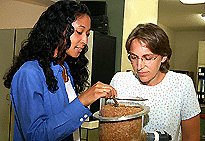Enzyme Research Benefits Feed and Pulp Industries
Enzyme Research Benefits Feed and Pulp Industries

Imagine if your backyard compost pile produced a special, highly-valuable substance while it was breaking down your yard waste. You'd likely want to make large amounts of compost at the lowest cost possible in order to produce more of that valuable substance.
That's what UK agricultural engineer Sue Nokes and graduate student Mari Chinn are trying to do in their laboratory. Only they're not using compost – they're using wheat bran, and the substance they're making is a valuable enzyme called xylanase.
"Xylenase is an industrial enzyme used in animal feed to help with digestion, and is also used in the pulp industry to help bleach paper," said Sue Nokes, UK agricultural engineer. "Here in our lab we're fermenting wheat bran in a sterilized chamber. As the fungus degrades the bran it produces the enzyme xylanase."
Nokes said the growing fungus might be thought of as a little bioreactor that's manufacturing xylanase. The process is called solid state fermentation because the enzyme is produced on solid matter rather than in liquid. The difficulty in this type of fermentation is keeping the enzyme- producing fungus alive.
"We have to carefully monitor the growth of the fungus because we want to provide an environment where the organism is stable," said Chinn, who's earning a master's degree in biosystems and agricultural engineering. "We use sensors to continually monitor temperature, oxygen concentration, airflow rates, and air humidity."
"All the sensors have to be sterile," said Nokes. "This isn't the case for most situations, such as composting. Our instruments have to be able to withstand high temperatures in steam, or else chemical sterilization."
The goal of the research is to develop a low-cost solid-state fermentation method for mass production of industrial enzymes. This could help lower the costs for feed or paper producers, and ultimately for consumers – such as farmers – who buy the products.
"With animal feeds, we want to keep costs down as low as possible," said Nokes. "The challenge with solid state fermentation is that growing conditions for the enzyme-producing fungus have to be just right, and doing that on an industrial scale is not easy."
According to Chinn, producing enzymes through solid-state fermentation could also benefit the environment.
"Instead of continuing to use certain chemicals to aid their production processes, manufacturers might choose instead to use more natural methods -- such as enzymes -- if the costs were lower," Chinn said.
